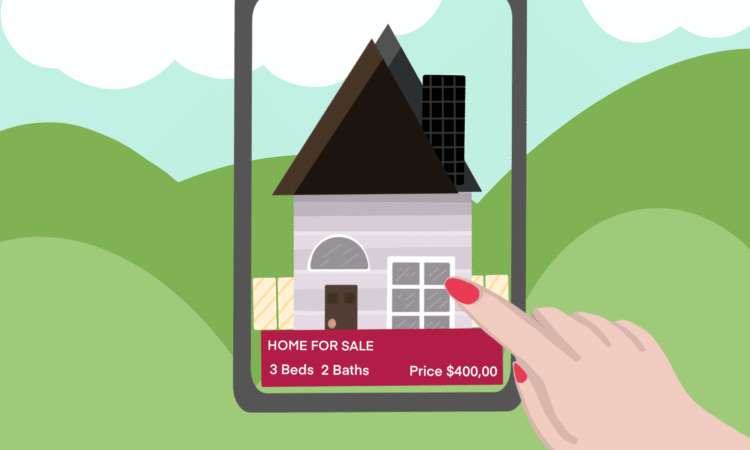
It can take more than two months to list, market and close on a home sale. For sellers who don’t have that kind of time, there is a faster alternative. IBuyers (short for “instant buyers”) are investment firms that make all-cash offers on properties, sight unseen.
Companies like Opendoor use algorithms incorporating property details, market data, and comparable home prices to generate bids in as little as 24 hours.
“If you need to sell right now, iBuying is a great option,” said Kevin Greene, head of real estate for property intelligence provider Cotality. “It’s a good way to get someone to unload a property for you.”
Typically, iBuyers offer less than what you might get with a real estate agent. But sellers can go from an offer to close in less than a month. That’s enticing if you are juggling two mortgages, have to relocate quickly or are just looking for fast cash.
How does iBuying work?
After an initial quote, the iBuyer will conduct an in-person assessment to verify that the property meets its standards. If the seller accepts the final bid, the closing process can take just two to four weeks — much faster than the 42-day average for traditional home sales.
It’s an all-cash offer, so there’s no wait for the underwriting process or and no risk that the financing will fall through. In addition, the seller doesn’t have to foot some of the expenses associated with selling a home, like renovations or staging.
That convenience comes at a cost, however. While transaction data is sparse, a MarketWatch study found that iBuyers offer, on average, 11% less than traditional buyers for the same property. With the median price for an existing home at $415,500, that’s a difference of nearly $46,000.
There are also higher fees involved with iBuying — between 7% and 18% for repairs, closing costs and convenience fees, compared to the 5% or 6% commission typical of a real estate agent. For some sellers, that added expense is worth avoiding additional mortgage payments, multiple showings and drawn-out negotiations.
“The iBuyer has to cover everything between the time that they purchase the home and sell it,” Greene said. “What if it needs paint or new carpet? And, they are a business — so there’s some margin added to make a little money as well.”
IBuyers vs. other home investors
IBuyers are different than the wholesalers whose “We buy houses for cash” billboards pop up along highways.
“Typically, [wholesalers] are looking for a distressed property they can get right away,” Greene said, “They’ll say, ‘Hey, you owe X, we’ll pay X,’ and you can walk away and be done.”
IBuyers are more particular. Opendoor, the largest by far, only bought about 15,000 homes in 2024. There are limitations on the price, size and age of a house that an iBuyer will consider. Properties with serious structural damage or that are in foreclosure are also rejected.
Instant buying started in the early 2010s but became increasingly popular in 2021 and 2022, when rates were historically low and the housing market was moving at turbo speed.
“Properties stayed on the market for less than a week and prices were increasing,” Greene said. “A lot of folks had already found another house and were looking at getting out of their current home quickly, so they didn’t mind taking a haircut on the price.”
Popular iBuying companies
Opendoor, which operates in 26 states and Washington, D.C., only charges a 5% convenience fee. For an additional daily rate, sellers can stay in their homes for up to 17 days after closing.
Opendoor
-
Price range
$100,000 to $600,000. More in some locations.
-
Fees
-
Cash-offer availability
Alabama, Arizona, California, Colorado, Florida, Georgia, Idaho, Indiana, Kansas, Massachusetts, Michigan, Minnesota, Missouri, Nevada, New Jersey, New Mexico, New York, North Carolina, Ohio, Oklahoma, Oregon, South Carolina, Tennessee, Texas, Utah and Virginia
-
Exclusions
Does not buy houses that are on two or more acres, built before 1930, located in a flood zone, in foreclosure, owned by a lender or occupied by a tenant. Prefab and mobile homes are also excluded, as are some properties that are damaged or dated.
The second-largest iBuyer, Offerpad, operates in 12 states. It does not disclose its convenience fee on its website. It allows sellers to stay three days after closing for free and covers moving costs for homeowners who relocate within 50 miles
Offerpad
-
Price range
Up to $1 million. (More in some markets.)
-
Fees
6% to 10% of the home price.
-
Cash-offer availability
Alabama, Arizona, Colorado, Florida, Georgia, Indiana, Missouri, Nevada, North Carolina, Ohio, South Carolina and Texas.
-
Exclusions
Does not buy houses that are vacant at closing, built before 1950, on more than two acres, with structural or foundational issues, or where there is no clear owner. Prefab, manufactured and mobile homes are also excluded.
Who is iBuying for?
IBuying makes the most sense for homeowners looking to offload their property quickly and efficiently. That includes sellers who have inherited a relative’s house or who have accepted a job offer in another state.
If your priority is getting the best offer, however, the traditional real estate market is a better bet.
“The biggest risk of using an iBuyer is not getting the highest price,” said Greene. A realtor who knows the local market and can give you their personal attention will get you the most, he added, even if it takes longer.
Pros and cons of selling to an iBuyer
Pros
- All-cash offer
- Faster closing process
- Can be done mostly online
Cons
- Homes sell for less than the market value
- Seller pays convenience fee and closing costs
- House must meet strict age and condition standards
- Not available in all states
iBuying FAQs
What are the fees for using an iBuyer?
IBuyers charge sellers between 7% and 18% in convenience fees, repairs and closing costs. That’s more than the 5% to 6% most real estate brokers ask for.
How much less do iBuyers pay for homes compared to the traditional market?
On average, iBuyers pay about 11% less than what a conventional buyer would. For a median-priced home, that can be over $40,000.
Is it worth using an iBuyer to sell my home?
Selling to an iBuyer is a solid option if your focus is on quickly unloading a property and avoiding the risk that a buyer’s financing might fall through. But if you want the best price and pay fewer fees, an iBuyer might not be a good fit.
Subscribe to the CNBC Select Newsletter!
Money matters — so make the most of it. Get expert tips, strategies, news and everything else you need to maximize your money, right to your inbox. Sign up here.
Why trust CNBC Select?
At CNBC Select, our mission is to deliver high-quality service journalism and comprehensive consumer advice to our readers, enabling them to make informed financial decisions. Every article is based on rigorous reporting by our team of expert writers and editors with extensive knowledge of financial products. While CNBC Select earns a commission from affiliate partners on many offers and links, we create all our content independently of our commercial team and any third parties, and we pride ourselves on maintaining high journalistic standards.
Catch up on CNBC Select’s in-depth coverage of credit cards, banking and money, and follow us on TikTok, Facebook, Instagram and Twitter to stay up to date.
Editorial Note: Opinions, analyses, reviews or recommendations expressed in this article are those of the Select editorial staff’s alone, and have not been reviewed, approved or otherwise endorsed by any third party.




